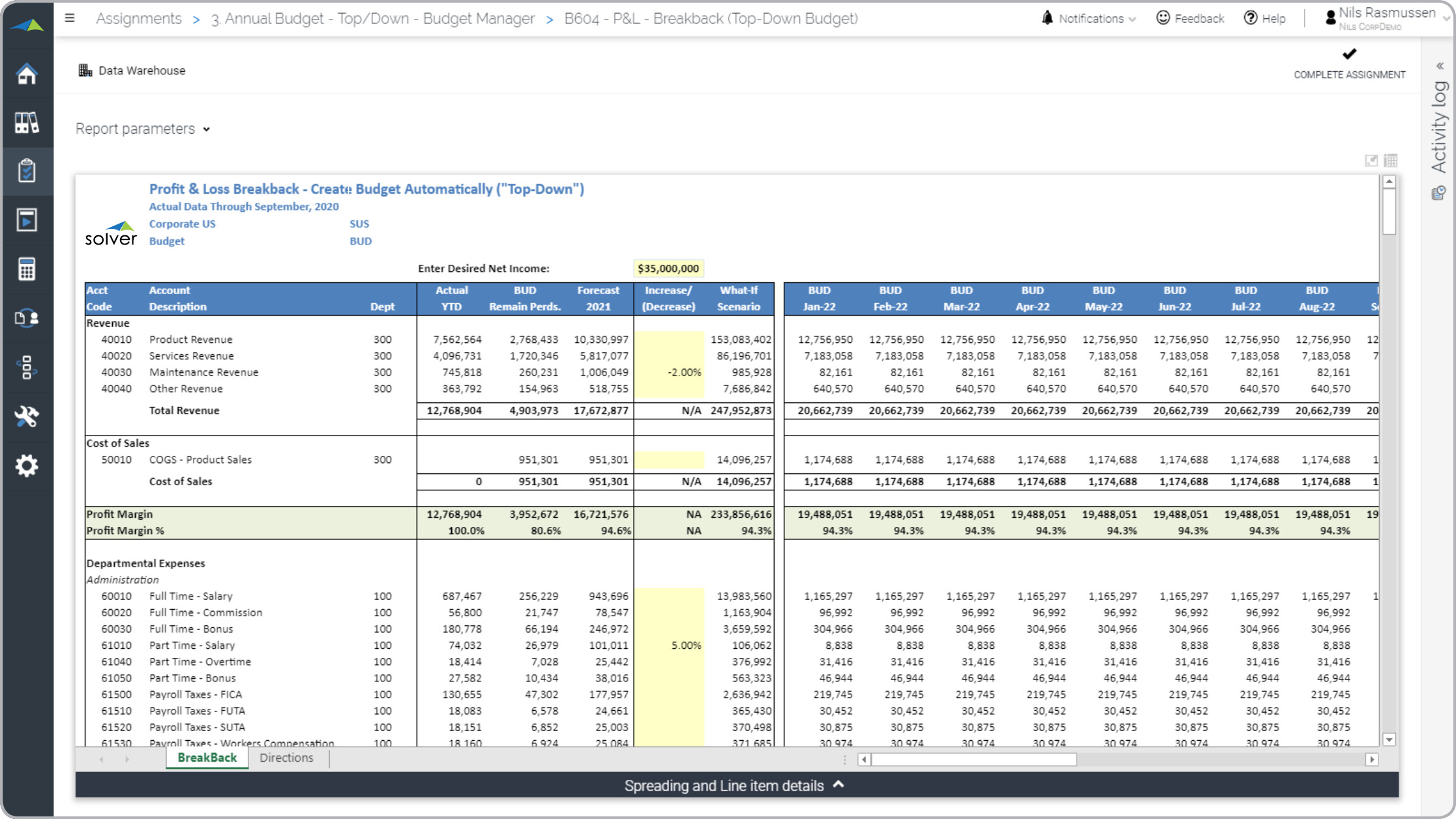Top-Down Profit & Loss Budget Template for Dynamics 365 Business Central
What is
a
Top-down Profit & Loss Budget Form
? The Top-down Profit & Loss (P&L) budget form is a template that enables budget managers and analysts to swiftly generate budget or forecast scenarios. This budget model is known as a what-if, break-back, or modeling template, depending on who you ask. The form features a crucial functionality that allows for the automatic calculation of revenues and expenses for all departments and GL accounts. By entering the desired profit at the top of the form, the formulas automatically calculate all the rows and distribute the annual amounts across the months. This can be achieved through a flat spread or following calculations based on the seasonality of the previous year. Furthermore, each account or row can be modified up or down if necessary. An example of this type of budget model is provided below.
Purpose of
Top-down P&L Budget Forms Top-down P&L Budget Forms serve as a means for companies and organizations to allow budget managers to create one or more P&L budget versions with ease and speed. When utilized as part of sound business practices in a Financial Planning & Analysis (FP&A) Department, these budget forms enhance a company's scenario planning capabilities and mitigate the risks associated with traditional bottom-up budgets that prolong the budget process. It is also useful when a company only has time to create a single budget scenario.
Benefits to Users Top-down Profit & Loss Budget Forms can provide several benefits to business users. Firstly, these forms can help users make better decisions by providing a clear and concise view of their financial situation. By having access to accurate financial data in real-time, users can easily identify areas of the business that are performing well and those that need improvement. This information can help them make informed decisions that are aligned with the overall business strategy.
Top-down P&L Budget Form
Example Here is an example of a P&L budget input form with various features such as comments, spreading, and etc....
You can find 100’s of additional examples
here.
Who Uses This Type of
Budget Model
? The typical users of this type of budget model are: CFOs, Budget Managers, and Department Heads.
Other
Budget Model
s Often Used in Conjunction with
Top-down P&L Budget Forms Most Financial Planning & Analysis (FP&A) Departments use several different Top-down P&L Budget Forms, along with classic bottom-up budget forms, often covering detailed templates for payroll, capital expenses, sales and other management and control tools.
Where Does the Data for Analysis Originate From? The Actual (historical transactions) data typically comes from enterprise resource planning (ERP) systems like: Microsoft Dynamics 365 (D365) Finance, Microsoft Dynamics 365 Business Central (D365 BC), Microsoft Dynamics AX, Microsoft Dynamics NAV, Microsoft Dynamics SL, Sage Intacct, Sage 100, Sage 300, Sage 500, Sage X3, SAP Business One, SAP ByDesign, Netsuite and others. In analyses where budgets or forecasts are used, the data most often originates from in-house Excel spreadsheet models or from professional corporate performance management (CPM/EPM) solutions.
What Tools are Typically used for Reporting, Planning and Dashboards? Examples of business software used with the data and ERPs mentioned above are:
- Native ERP report writers and query tools
- Spreadsheets (for example Microsoft Excel)
- Corporate Performance Management (CPM) tools (for example Solver)
- Dashboards (for example Microsoft Power BI and Tableau)
- View 100’s of reporting, consolidations, planning, budgeting, forecasting and dashboard examples here
- Discover how the Solver CPM solution delivers financial and operational reporting
- Discover how the Solver CPM solution delivers planning, budgeting and forecasting
- Watch demo videos of reporting, planning and dashboards
Global Headquarters
Solver, Inc.
Phone: +1 (310) 691-5300

